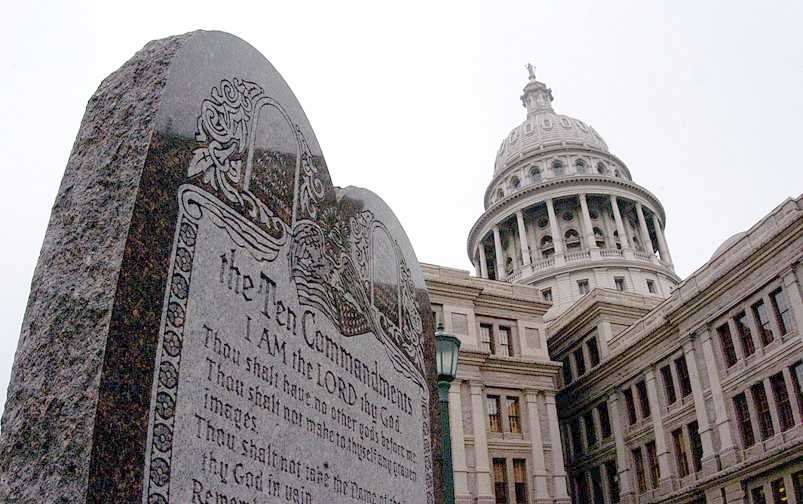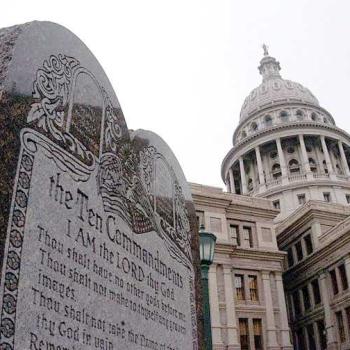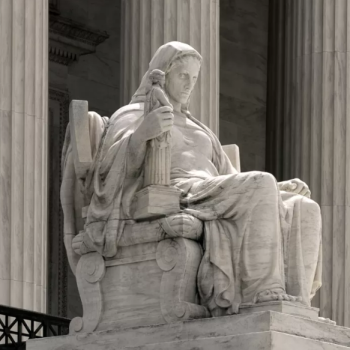Is U.S. law based on the Ten Commandments? Over the years, many in the U.S. have called for displaying the Ten Commandments in public schools and courthouses. To sidestep the obvious conflict with the establishment clause, it’s argued that U.S. law is based on the Ten Commandments. So, displaying the Commandments is not really about religion, they say, even though several Commandments (versions vary) are directions about how humans should relate to God. Which pretty much makes it about religion.
As I write there are a number of local school board candidates around the nation making these arguments and vowing to display the Ten Commandments in public schools, if elected. In Florida, teachers complain that they’re being forced to teach that the Ten Commandments are the basis of U.S. law, when legal scholars say otherwise.
Of course, the U.S. legal system is an infinitely complex thing, and the many parts of it can be traced to diverse origins. But the argument is that the Ten Commandments are the absolute, foundational basis of the whole thing. So let’s take a quick look for historical evidence of this claim.
English Common and Civil Law
Let’s start with laws in colonial America. Historians tell us that law and law enforcement in the early European colonies of North America were, um, hit and miss. There was a shortage of lawyers. And courts. And police, for that matter. But by the beginning of the 18th century — the century in which thirteen colonies became the United States — the British colonies had legal systems mostly based on English common law.
Common law is defined as customary law based on court cases and judicial decisions but not encoded in written statutes. In contrast, laws written by legislatures are civil or statutory laws. Today, there’s not much common law left in U.S. federal law, but some states still make use of it.
English common law was a project of the Normans, who invaded England from Normandy in 1066 and deposed the Angles and Saxons. By the 18th century it had become a robust thing with lots of precedent and custom that covered most legal situations. But, then, where did Norman law come from? In Normany there probably was some influence of Catholicism. It’s also the case that Normandy had been invaded and colonized by Scandanavian Vikings, beginning about 790 CE. So, common law in Normandy also carried a strong influence of Viking law.
The origin of civil law in England, and Europe generally, was very much a legacy of the Roman Empire. The Romans occupied and controlled a large part of Europe, including much of Britain, through the first four centuries or so of the 1st millennium CE. The Romans left a foundation upon which the first English civil law was built. I found a nice article from the Berkeley School of Law that goes into more detail.
Law in the Bronze Age
If the argument is that the Ten Commandments are the foundation of U.S. law, maybe we have to go back to the beginning of law itself to find that connection.
Contrary to what I dimly remembered, the law code of Hammurabi, who reigned in Babylon from 1792 to 1758 BCE, was not the earliest code of laws we know about. There were some earlier encoded laws in Mesopotamia, including the laws of Urukagina, which date to the 24th century BCE. We have only fragments of that one. Another code, that of Ur-Nammu (ca. 2100–2050 BCE), outlawed murder, theft, and most adultery, as does the Ten Commandments.
Hammurabi’s code is significant because it is more detailed and complete than the earlier codes. Hammurabi claimed to have received the laws from Shamash, the Babylonian god of justice, and then they were engraved on a stele for public display. You can read Hammurabi’s laws here. I notice that Hammurabi had severe penalties, including the death sentence, for bearing false witness, or bringing a claim to court without proper evidence.
The Exodus/Ten Commandments story traditionally is dated to about 1300 BCE, which is later than Hammurabi and the other Mesopotamian codes. Through the years some scholars have argued that the Hammurabi code, and the story of how the laws were received from a god and then engraved on a stone stele, influenced the Ten Commandments story. Scholars also have pointed to many notable similarities between the Hammurabi code and Mosaic law, or the body of Jewish law recorded in the Torah and Old Testament, which includes the Ten Commandments. I don’t believe there’s an overwhelming consensus that Mosaic law was influenced by Hammurabi, however.
The Source of All Morality?
I did identify one allegedly scholarly argument for the Ten Commandments being the basis of U.S. law. It’s titled “The Fount of Everything Just and Right? The Ten Commandments as a Source of American Law,” published in The Journal of Law and Religion, Cambridge University Press, October 15, 2015. The author’s name is Steven K. Green. And I can’t say much more about it, because it’s behind a subscription paywall. But this is from a preview:
It is axiomatic that many of the principles contained in the Ten Commandments are fundamental to the Western legal tradition. Prohibitions on murder, theft, and perjury are found in nearly every legal code. Notions of respect for one’s parents and admonitions against adultery are also implicit, if not explicit, in the quasi-legal realm of normative rules that order many societies. Few people, if any, would dispute that the Ten Commandments—and its parallels from other ancient cultures—as well as other directives contained in the Pentateuch of the Hebrew and Christian Scriptures, inform our notions of right and wrong and, as such, have influenced the development of Western law of which the American legal system is part.
I’ve already documented that prohibitions on murder, theft, perjury, and adultery are older than the Ten Commandments. Further, there are similar moral codes in other religions. The ancient yamas of Hinduism, for example, include ahimsa (nonviolence), satya (truthfulness), asteya (not stealing), and brahmacharya (chastity and marital fidelity). And if you want respect for one’s parents, you should check out Confucianism.
The Ten Commandments as Tribal Totem
In conclusion, there is no historical basis for claiming that U.S. law, or any other legal system, is based on the Ten Commandments. If you think about it, it’s probably the case that humans couldn’t begin to live in communities until they had worked out some rules prohibiting murder and theft. Otherwise we would still be huddled in our caves guarding our families and flint arrowheads from the people in the other caves. Rules about not bearing false witness and marital fidelity would not have been far behind. It shouldn’t surprise us that early civilizations around the globe stumbled on similar sets of rules, because otherwise they wouldn’t have developed into civilizations.
I appreciate and respect that the Ten Commandments are revered in the religions of Judaism and Christianity. But for those of us who are not Jewish or Christian, insisting that the Commandments are the one true original source of all goodness and righteousness is just tiresome and silly. Further, from the Axial Age onward philosophers and sages of many traditions have said the absolute basis of morality is compassion, not rules. There is nothing in the Ten Commandments about compassion.
For the Christians who insist on displaying the Ten Commandments in public schools and courthouses, I say the Commandments are less of a teaching and more of a tribal totem. A totem is a symbol or object adopted as an emblem of a group of people, such as a family or clan. Display of a totem could have religious significance, or it also can just serve as a sign that this group is dominant here. Displays of the Ten Commandments in public places are meant to signal the dominance of Christianity. And that’s all this controversy is about.














